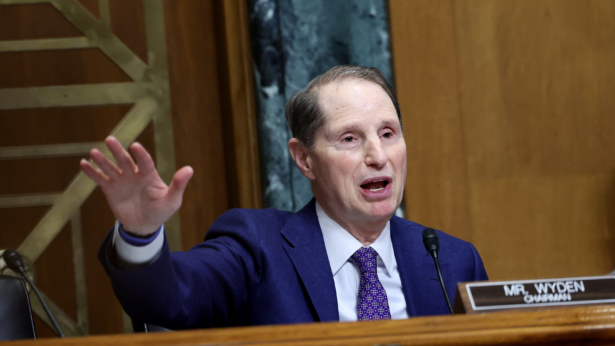Most of the green energy tax benefits provided by President Joe Biden’s $750 billion Inflation Reduction Act (IRA) of 2022 are going into the coffers of big banks and billion-dollar corporations, according to House Ways and Means Committee Chairman Jason Smith (R-Mo.).
“While President Biden’s supercharged IRS is warming up to target working Americans, his administration is getting ready to spend those tax dollars to subsidize special interest green energy projects of billion-dollar companies,” Smith said in a statement based on a new congressional analysis issued by the Joint Committee on Taxation (JCT).
Smith was referring to the Biden administration’s controversial plan to double the size of the IRS workforce by adding 87,000 new tax investigators and auditors. House Republicans want to defund the IRS expansion plan.
“Many of the same companies getting a green corporate welfare check have shed their American identity to do business with the Chinese Communist Party (CCP), and, as a result, our tax dollars are being funneled to Chinese entities that manipulate our key supply chains,” Smith continued.
“While House Republicans are fighting for working families struggling to pay their gasoline and utility bills, House Democrats are prioritizing foreign nations and sending as many taxpayer-funded handouts to corporations as possible. With big banks pocketing three times more of these special interest tax breaks than any other industry, it’s clear Democrats are rewarding their friends on Wall Street that push their partisan ESG agenda,” the Missouri Republican said.
The JCT includes members from both the Senate and House of Representatives, and the chairmanship and vice chairmanship positions are rotated between the two chambers from one Congress to the next. Smith is the chairman this year, while Sen. Ron Wyden (D-Ore.), the most senior senator on the panel, is the vice chairman.

The JCT analysis was done by the panel’s bipartisan professional staff. Biden signed the IRA into law on Aug. 2, 2022, claiming during a White House signing ceremony that the bill represents the federal government’s “most aggressive action ever—ever, ever, ever —in confronting the climate crisis and strengthening our economic—our energy security.”
But seven and a half months after that ceremony, among the major findings of the JCT analysis are that firms with over $1 billion in sales are set to receive more than 90 percent of the green energy tax subsidies provided by the IRA and, large banks and insurers receive in excess of 50 percent of the green energy tax breaks, far more than any other industry or sector, according to Smith.
Two green energy tax credit categories are the main focus of the JCT analysis, the Electricity Production Tax Credits and the Electricity Investment Tax Credits. The analysis found that 97 percent of the former credits go to corporations valued at $1 billion or more, while 92 percent of the latter credits go to large banks and insurance firms.
But Ways and Means Democrats hotly disputed Smith’s claims during an April 19 hearing on the JCT analysis, with Rep. Judy Chu (D-Calif.), the panel’s second-ranking Democrat, arguing that the IRA is addressing the biggest climate crisis ever and creating thousands of American jobs in the process.
Dems Argue Benefits Are Needed
“The climate crisis is real, and its effects are only becoming more extreme. In California, all but one of the state’s ten largest wildfires in history have occurred since 2017, and years of severe drought have now been followed by months of extreme rain and snow. Democrats did something about this, and we made sure that the clean energy transition will mean more jobs, more manufacturing, and higher wages here in the United States,” Chu told the hearing.
“The Inflation Reduction Act is the single largest clean energy investment in U.S. history. With first-of-their-kind requirements to strengthen American supply chains and create quality, high-paying jobs, this legislation is proving that green jobs are good jobs, and putting the country on a path to responsible, sustainable energy independence,” Chu said.
“So far, the green tax credits have spurred over 100,000 jobs for U.S. electricians, mechanics, construction workers, technicians, support staff, and others. Just in the law’s first six months, 90 new clean energy projects have been announced in 31 states. These projects include battery manufacturing, electric vehicle manufacturing, and wind and solar manufacturing sites. If that isn’t delivering results for the American people, then what is,” she continued.
During the hearing, Republicans also criticized the IRA for providing revenue streams that benefit the Chinese Communist Party (CCP).
Rep. Darin LaHood (R-Ill.), who also serves on the House Permanent Select Committee on Intelligence and the House Select Strategic Competition Between the United States and the Chinese Communist Party Committee, told the hearing that “a particular area of concern that I have is the lack of safeguards that were put in place to prevent these incentives from being enjoyed by our adversaries. … We learn every day about the growing threats from China and the Inflation Reduction Act demonstrates how easy it is for us to literally let them in through the front door.”
CCP Misuses US Resources
One of the witnesses testifying during the hearing, GreenMet Chief Executive Officer Drew Horn, responded to LaHood, noting that “we have to be careful that, as we look at driving catalysts to drive U.S. industry and U.S. innovation, that we don’t open ourselves to a Trojan Horse to come in a work against us. The CCP is an expert at doing this, they know exactly how to exploit what we do, they’ve been doing it for decades, and their plan is to suppress us and prevent us from being a competitor to their world domination.”
Horn continued, saying there are U.S. firms very close to being in a position to compete strongly against the CCP in acquiring and using rare earth minerals that are required for batteries used in electric vehicles and other green energy applications.
“They are a threat to [China’s goal of] global hegemony and the monopoly that the CCP has on the industry, and they will do everything possible to prevent those options from coming online, from price fluctuations, flooding the market, everything measurable,” Horn testified.
“So when the resources designed to go to U.S. companies to allow them to compete on a fair stage with the Chinese Communist Party are diverted, it allows the CCP not only to take those funds but to suppress any possible legitimate competition for a better service provided,” Horn said.
GreenMet is a Washington-based firm seeking “to accelerate the development of safe, reliable rare earth mineral supply chains for the 21st Century. This is critical to North America’s economic future and represents a $1 trillion potential deal flow,” according to its website.
Currently, 84 percent of the world’s rare earth minerals are mined and produced outside of North America, with the vast majority of such activity under the control—direct and indirect—of the CCP.
From The Epoch Times


